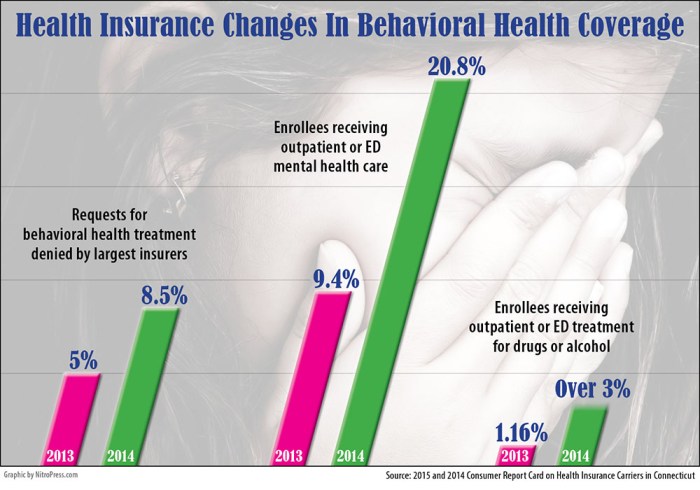Mental Health Coverage: What Insurers Wont Tell You – Unveiling the Truth
Delving into Mental Health Coverage: What Insurers Won’t Tell You, this piece aims to shed light on the hidden aspects of mental health insurance, offering a comprehensive understanding that is often overlooked.
Exploring the nuances of mental health coverage and the intricacies of insurance policies, this topic is crucial for individuals seeking clarity on their coverage.
Understanding Mental Health Coverage

Insurance companies provide mental health coverage as part of their health insurance plans to help individuals access services that address their mental well-being.
Types of Mental Health Services Covered
- Therapy Sessions: Insurance typically covers individual, group, and family therapy sessions with licensed mental health professionals.
- Psychiatric Care: Coverage may include visits to psychiatrists for medication management and treatment of mental health disorders.
- Inpatient Treatment: Some plans cover inpatient mental health treatment in hospitals or residential facilities for severe cases.
- Outpatient Programs: Insurance may cover outpatient programs such as intensive outpatient programs (IOP) or partial hospitalization programs (PHP).
Importance of Mental Health Coverage
Mental health coverage is essential for individuals as it ensures they have access to necessary services to address mental health concerns without financial burden. It promotes early intervention, reduces stigma around seeking help, and improves overall well-being.
Limitations of Mental Health Coverage

When it comes to mental health coverage, insurers often have limitations that can impact individuals seeking care. These limitations can vary, but they typically exclude certain treatments or services that are crucial for mental health support.
Excluded Mental Health Treatments
Insurers may exclude certain mental health treatments from coverage, such as:
- Couples therapy or marriage counseling
- Art therapy or other alternative forms of treatment
- Long-term residential care for severe mental health conditions
Impact of Limitations
These limitations can have a significant impact on individuals seeking mental health care. For example, someone in need of couples therapy to improve their relationship may not be able to access this service if it is not covered by their insurance.
Similarly, those with severe mental health conditions requiring long-term residential care may struggle to afford treatment without insurance coverage, leading to worsened outcomes and increased financial burden.
Hidden Costs and Restrictions
When it comes to mental health coverage, there are often hidden costs that insurers may not disclose upfront, making it challenging for individuals to access necessary care. Additionally, insurers impose various restrictions and limitations that can further complicate the process of seeking help for mental health issues.
Hidden Costs of Mental Health Coverage
Hidden costs associated with mental health coverage may include high deductibles, copayments for therapy sessions, out-of-network provider fees, medication costs, and coverage limits for certain types of treatments. These costs can add up quickly and make it difficult for individuals to afford the care they need.
Restrictions and Limitations Imposed by Insurers
- Pre-authorization requirements for mental health services
- Limited coverage for certain types of therapy or treatments
- Caps on the number of therapy sessions allowed per year
- Requirement to try less expensive treatments before accessing more specialized care
Navigating Hidden Costs and Restrictions
One way to navigate hidden costs and restrictions is to carefully review your insurance policy and understand what is covered and what isn't. It's essential to ask questions, advocate for yourself, and explore alternative options such as sliding scale fees, community mental health resources, or telehealth services.
Additionally, consider reaching out to mental health providers directly to inquire about payment options and potential financial assistance programs.
Disparities in Mental Health Coverage
Disparities in mental health coverage can have a significant impact on individuals seeking care for mental health conditions. These discrepancies often arise between different insurance plans, influenced by various socioeconomic factors that can affect the quality and extent of coverage provided.
Disparities Between Insurance Plans
- Insurance plans may vary in the types of mental health services covered, such as therapy sessions, medication, or hospitalization.
- Some plans may have higher copayments or deductibles for mental health care compared to other medical services.
- Network restrictions can limit access to mental health providers, leading to disparities in the availability of care.
Socioeconomic Influences on Coverage
- Individuals with lower incomes may struggle to afford out-of-pocket costs associated with mental health treatment, impacting their access to care.
- Employer-sponsored insurance plans may offer different coverage levels based on the size and nature of the organization, creating disparities in mental health benefits.
- Racial and ethnic minorities may face barriers in accessing quality mental health care due to systemic inequalities within the healthcare system.
Impact on Access to Mental Health Care
- Disparities in mental health coverage can result in delays in seeking treatment or inadequate care, leading to worsened mental health outcomes.
- Individuals from marginalized communities may be disproportionately affected by disparities in coverage, exacerbating existing mental health disparities.
- Lack of parity in mental health coverage compared to physical health coverage can contribute to stigma and discrimination against individuals seeking mental health care.
Ending Remarks
Wrapping up the discussion on Mental Health Coverage: What Insurers Won’t Tell You, it becomes evident that being informed and proactive is key to navigating the complexities of mental health insurance effectively.
Essential FAQs
What is the typical coverage for therapy sessions?
Insurance coverage for therapy sessions varies, but it often includes a limited number of sessions per year. It's essential to check your policy for specifics.
Are pre-existing mental health conditions covered?
Most insurance plans cover pre-existing mental health conditions, but there may be waiting periods or limitations. Review your policy for details.
Can I choose my own mental health provider?
Insurance plans often have a network of preferred providers, but you may have the option to choose an out-of-network provider at a higher cost. Check with your insurer for options.
Do insurance companies cover alternative mental health treatments?
Coverage for alternative mental health treatments like acupuncture or meditation varies by insurance company. It's recommended to inquire directly with your insurer.



